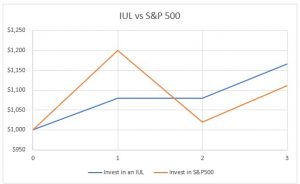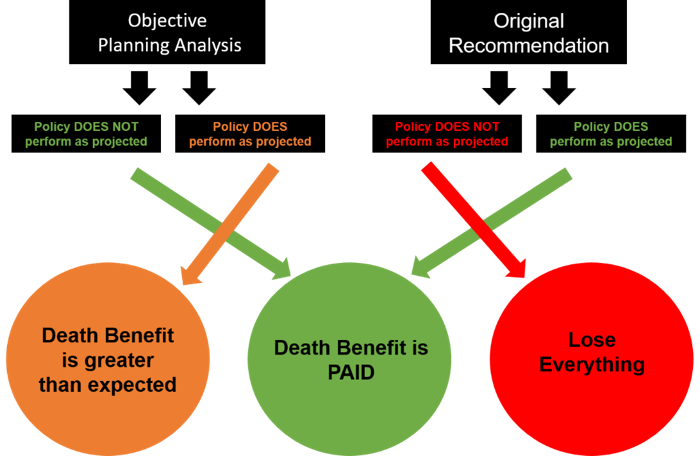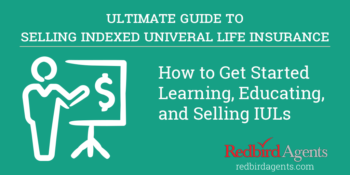All Categories
Featured
Table of Contents
For making a limited amount of the index's development, the IUL will never ever obtain less than 0 percent interest. Even if the S&P 500 declines 20 percent from one year to the next, your IUL will not lose any type of cash money value as a result of the marketplace's losses.

Visualize the interest intensifying on an item with that kind of power. Given all of this information, isn't it possible that indexed universal life is a product that would enable Americans to acquire term and invest the remainder?
A true investment is a safety and securities item that undergoes market losses. You are never subject to market losses with IUL just since you are never based on market gains either. With IUL, you are not bought the market, yet simply earning rate of interest based on the efficiency of the market.
Returns can expand as long as you continue to make repayments or keep a balance.
Guaranteed Universal Life Insurance Cost
Unlike global life insurance, indexed universal life insurance's cash worth earns passion based upon the efficiency of indexed stock markets and bonds, such as S&P and Nasdaq. Remember that it isn't straight purchased the stock exchange. Mark Williams, Chief Executive Officer of Brokers International, points out an indexed universal life policy is like an indexed annuity that seems like universal life.

Because of these functions, irreversible life insurance can function as an investment and wealth-building tool. Universal life insurance coverage was created in the 1980s when rates of interest were high. Like various other kinds of long-term life insurance, this plan has a cash money worth. Universal life's money value gains rate of interest based upon current cash market rates, yet rates of interest fluctuate with the marketplace.
Indexed universal life plans provide a minimum surefire interest price, likewise understood as a rate of interest crediting flooring, which lessens market losses. Say your money value loses 8%.
Universal Life Vs Term Insurance
It's likewise best for those going to assume additional risk for greater returns. A IUL is a long-term life insurance policy policy that borrows from the residential or commercial properties of an universal life insurance coverage plan. Like global life, it permits flexibility in your survivor benefit and premium settlements. Unlike universal life, your cash value grows based upon the efficiency of market indexes such as the S&P 500 or Nasdaq.
Her work has been published in AARP, CNN Underscored, Forbes, Ton Of Money, PolicyGenius, and U.S. Information & World Report. ExperienceAlani has examined life insurance and animal insurance policy companies and has actually written various explainers on travel insurance policy, credit score, financial obligation, and home insurance coverage. She is enthusiastic concerning debunking the intricacies of insurance policy and various other individual financing subjects to ensure that visitors have the details they need to make the very best cash decisions.
:max_bytes(150000):strip_icc()/pros-cons-indexed-universal-life-insurance.asp_v1-e119226901bc464593a496c003551ea0.png)
Paying only the Age 90 No-Lapse Premiums will guarantee the survivor benefit to the insured's attained age 90 yet will certainly not assure money worth build-up. If your customer ceases paying the no-lapse warranty premiums, the no-lapse feature will certainly end before the ensured duration. If this takes place, added premiums in a quantity equivalent to the deficiency can be paid to bring the no-lapse function back in force.
I lately had a life insurance policy salesman reveal up in the comments thread of a blog post I published years ago about not blending insurance policy and investing. He assumed Indexed Universal Life Insurance Coverage (IUL) was the finest point because cut bread. On behalf of his placement, he uploaded a web link to a write-up created in 2012 by Insurance Coverage Agent Allen Koreis in 2012, entitled "16 Reasons that Accountants Prefer Indexed Universal Life Insurance Policy" [link no more readily available]
Best Indexed Universal Life Companies
Initially a short description of Indexed Universal Life Insurance Coverage. The tourist attraction of IUL is evident. The facility is that you (nearly) obtain the returns of the equity market, without any threat of shedding money. Currently, prior to you diminish your chair poking fun at the absurdity of that declaration, you require to understand they make a really convincing disagreement, at the very least till you check out the information and realize you do not obtain anywhere near the returns of the equity market, and you're paying much also much for the guarantees you're obtaining.

If the market decreases, you obtain the assured return, typically something between 0 and 3%. Of training course, given that it's an insurance plan, there are additionally the common costs of insurance coverage, commissions, and abandonment costs to pay. The details, and the reasons that returns are so awful when blending insurance and investing in this certain method, come down to basically three points: They just pay you for the return of the index, and not the rewards.
Fixed Universal Life Insurance
Your maximum return is topped. If you cap is 10%, and the return of the S&P 500 index fund is 30% (like last year), you get 10%, not 30%. Some plans only give a specific portion of the change in the index, state 80%. So if the Index Fund rises 12%, and 2% of that is dividends, the adjustment in the index is 10%.
Add all these effects with each other, and you'll locate that long-lasting returns on index universal life are quite darn near to those for whole life insurance coverage, favorable, yet low. Yes, these plans guarantee that the cash value (not the cash that mosts likely to the costs of insurance, certainly) will certainly not shed money, however there is no guarantee it will maintain up with inflation, much less expand at the rate you require it to expand at in order to give for your retirement.
Koreis's 16 factors: An indexed global life plan account value can never ever lose money as a result of a down market. Indexed universal life insurance policy guarantees your account value, securing gains from each year, called a yearly reset. That's real, yet only in nominal returns. Ask yourself what you need to pay in order to have a warranty of no nominal losses.
In investing, you obtain paid to take danger. If you don't wish to take much risk, don't expect high returns. IUL account values grow tax-deferred like a certified plan (individual retirement account and 401(k)); mutual funds do not unless they are held within a qualified plan. Put simply, this implies that your account worth take advantage of three-way compounding: You make passion on your principal, you make interest on your interest and you gain rate of interest accurate you would otherwise have actually paid in tax obligations on the passion.
Universal Life Death Benefit Options
Although certified plans are a much better choice than non-qualified plans, they still have problems absent with an IUL. Investment options are usually restricted to mutual funds where your account value is subjected to wild volatility from direct exposure to market danger. There is a big difference between a tax-deferred retirement account and an IUL, yet Mr.
You purchase one with pre-tax dollars, saving money on this year's tax obligation bill at your limited tax price (and will certainly often have the ability to withdraw your cash at a reduced reliable price later on) while you invest in the various other with after-tax dollars and will be compelled to pay rate of interest to borrow your own cash if you don't wish to give up the policy.
He throws in the traditional IUL salesman scare method of "wild volatility." If you dislike volatility, there are better means to decrease it than by getting an IUL, like diversity, bonds or low-beta supplies. There are no restrictions on the quantity that may be added annually to an IUL.

Why would the government put limitations on exactly how much you can put into retirement accounts? Possibly, just possibly, it's due to the fact that they're such a wonderful bargain that the federal government doesn't want you to save also much on taxes.
Latest Posts
My Universal Insurance
Universal Life Target Premium
Life Insurance Term Vs Universal